Today, my epicenter is the San Francisco Bay Area, but it wasn't always so: in 1997 I moved to Edinburgh, Scotland, to do my bachelors degree in Computer Science. In the end, I lived there twice: from 1997-2004, and again for a year in 2010. The first time, I started Elgg, the open source social networking platform. The second time, I worked for latakoo and was the first Geek in Residence at the Edinburgh Festivals Innovation Lab.
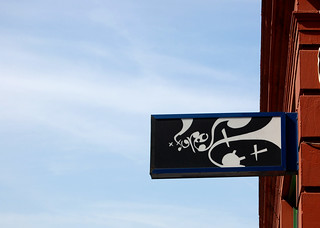 I miss The Forest Cafe, which, to me, is a symbol of Edinburgh's artistic cultural anarchy. I love that about the city: clubs and art shows occupy every nook and cranny. Of course, the big kahuna is the Edinburgh Festivals: twelve official festivals (and more unofficial ones) that double the size of the city and turn it into a melting pot of arts and creativity. The excellent social safety net doesn't hurt: healthcare is basically free, and Scottish students can go to Scottish universities without paying a penny. The marvelous Scottish Book Trusts mails childrens books to every new family, promoting an interest in reading. You can experiment without worrying about what's going to happen to you if you get ill. My circle in Scotland very much fit my values: compassionately left-wing, embracing of diverse sexualities and gender identities, secular, and questioning of cultural norms. Exactly how I would prefer the world to be.
I miss The Forest Cafe, which, to me, is a symbol of Edinburgh's artistic cultural anarchy. I love that about the city: clubs and art shows occupy every nook and cranny. Of course, the big kahuna is the Edinburgh Festivals: twelve official festivals (and more unofficial ones) that double the size of the city and turn it into a melting pot of arts and creativity. The excellent social safety net doesn't hurt: healthcare is basically free, and Scottish students can go to Scottish universities without paying a penny. The marvelous Scottish Book Trusts mails childrens books to every new family, promoting an interest in reading. You can experiment without worrying about what's going to happen to you if you get ill. My circle in Scotland very much fit my values: compassionately left-wing, embracing of diverse sexualities and gender identities, secular, and questioning of cultural norms. Exactly how I would prefer the world to be.
On the other hand, money is tight there. It's just the way it is. You can make a good living, and costs are low (particularly when you factor in health insurance, or the fact that you don't need to own a car). But if you want to form a startup, as I did, you're going to have a harder time.
 A sample of things we were told when we tried to get Elgg off the ground:
A sample of things we were told when we tried to get Elgg off the ground:
"It won't work."
"What about your pension?"
"That sounds like it's for teenage girls crying in their bedrooms." [Their words, not mine, I promise.]
I lost count of the number of times people who had started successful businesses told us to move to Silicon Valley. While culturally there was a lot of ambition, business ambition was looked upon less kindly. Scotland - like England - is very heavily influenced by the banking sector, and technology businesses were not a part of that mix. Despite having the opportunity to move to Silicon Valley, I chose to move to Oxford instead. "Why," I thought, stubbornly, "should tech startups have to be in California?" More on this in a bit.
I returned in 2010, shortly after I left Elgg. The environment had dramatically improved, as evidenced by the existence of the Geek in Residence position at the Edinburgh Festivals. When I did my computer science degree, our labs were literally in the basement next to the boiler room. The School of Informatics indicates a renewed focus on technology. Meanwhile, events like TechMeetup provide a focal point for the incredibly-talented local tech scene. The Edinburgh Hack Lab ticks the hackerspace box.
One of the clearest signs that Edinburgh is connecting its unique cultural scene with its technologists is Inspace, which is the Scottish counterpart to the Gray Area Foundation for the Arts. The space actually sits inside the University's Informatics building, and is the most amazing playground I've ever seen for artistic technologists, led by Mark Daniels, a passionate, smart curator.
Since I left Edinburgh for the second time, TechCube has opened to provide a space for tech startups. I've heard great things.
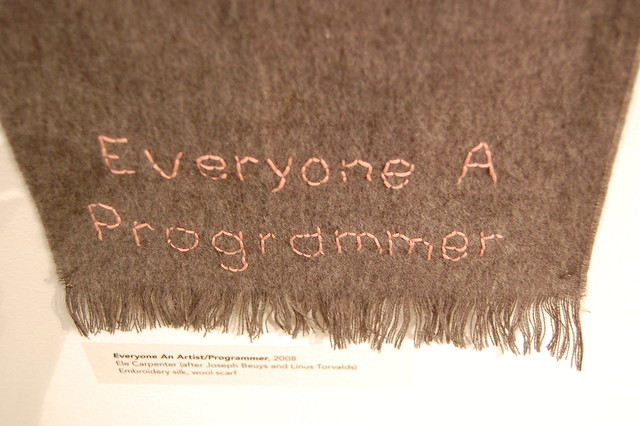

There's no less creativity in San Francisco. In fact, it being a much larger area, there's a lot more - but it's different. Whereas the safety net (and other cultural reasons) meant there could be unencumbered creative exploration, here even the art is entrepreneurial. Arts organizations are largely funded not by the government, but by patrons: this changes the dynamic entirely. Whereas in Scotland galleries and museums are free to walk into, here you must pay. Culture has a paywall.
 At least sometimes. I've been consistently delighted by Oakland, which has the kind of anarchic, widely-embracing spirit I love. Consider Oakland Nights Live, a live theater variety performance / on-stage talk show: the first time I attended, it was in a backyard, and I walked in to see a man in a viking helmet playing a see-saw like a musical instrument with a saw. Another episode was held on BART, which saw passengers become de facto audience members. These days it's at the Sudo Room, the kind of artistic / technical space that we have in spades here. I also regularly go to music events at the Firehouse Arts Collective, which owns an experimental space on the border between Oakland and Berkeley.
At least sometimes. I've been consistently delighted by Oakland, which has the kind of anarchic, widely-embracing spirit I love. Consider Oakland Nights Live, a live theater variety performance / on-stage talk show: the first time I attended, it was in a backyard, and I walked in to see a man in a viking helmet playing a see-saw like a musical instrument with a saw. Another episode was held on BART, which saw passengers become de facto audience members. These days it's at the Sudo Room, the kind of artistic / technical space that we have in spades here. I also regularly go to music events at the Firehouse Arts Collective, which owns an experimental space on the border between Oakland and Berkeley.
Nonetheless, in San Francisco, most of the art I've seen has had a commercial element. The flipside of that is that most commercial business has an artistic element. While the financial district certainly exists, a lot of the startups and tech businesses can also be thought of as art projects, and many of the great ones have been created by people with an artistic, anarchic bent (even if this is ebbing away with ever-rising costs).
There are intense, worsening social problems here, which have been written about at length elsewhere. I find them jarring. It's hard to walk through a BART station filled with homeless people and not feel some kind of intense emotion (for me, sadness and anger). People seem to have become hard to it, though, or worse, blame the homeless people for being homeless. That's foreign to me, and I find it disgusting. These people need help. (It must also be said that they are getting help, and San Francisco remains a very progressive city, by American standards. I don't understand the American resistance to socialized services, but it's less pronounced here than in most places.)
 While it's important to recognize the drawbacks, let's be real. The food is incredible, the city is beautiful, and although I have a lot of ambition to travel and live in different places around the world, I would also be happy if I stayed here for the rest of my life. Just the light is incredible: in Scotland the sun rises at 8:45am and sets at 3:50pm in January. Here it's steadily bright all year long. The people are friendly and helpful. It never freezes, but never gets too hot.
While it's important to recognize the drawbacks, let's be real. The food is incredible, the city is beautiful, and although I have a lot of ambition to travel and live in different places around the world, I would also be happy if I stayed here for the rest of my life. Just the light is incredible: in Scotland the sun rises at 8:45am and sets at 3:50pm in January. Here it's steadily bright all year long. The people are friendly and helpful. It never freezes, but never gets too hot.
It's also the best possible place to start any kind of technology business. That stubborn resistance to starting a company in Silicon Valley? Ridiculous. Don't repeat my mistake. Just about everyone is here, which means - in combination with the general friendliness - that it's easy to meet just about anyone for a coffee. And people will be interested in what you're doing, and try to connect you with people who can help. There's no cynicism towards ambition, and no desire to put you down. The culture is collaborative and open-minded.
Sometimes, I find this open-mindedness challenging: I'm used to a more secular culture, but the US is much more friendly to religion. In other parts of the country that often translates into conservative bigotry, but not here. It's just friendly. Correspondingly, I'm often challenged by my bias against religion; something I want to acknowledge, and be less of a jerk about. Anil Dash wrote a great piece about this.
I'm glad for my years in Scotland, which gave me a perspective I'm proud of. I sometimes struggle with the more individualistic culture here (and the absurdly hoppy beer). Tef's guide to San Francisco for Londoners is completely accurate. But at the same time, I'm so glad that this is where I landed. The tech industry has some well-publicized problems, but this is a place where you feel like you can make a difference, change the culture, and create a better future. While I feel like a fish out of water a lot of the time, I also feel like I belong.



 Share this post
Share this post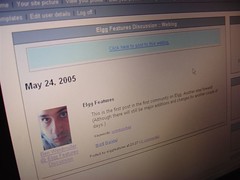
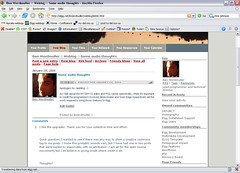
 Known is a platform for a new kind of social web. You can think of each Known site as being a single social profile, either for an individual or a group. Each one can interact with each other in a decentralized way (using
Known is a platform for a new kind of social web. You can think of each Known site as being a single social profile, either for an individual or a group. Each one can interact with each other in a decentralized way (using  On any device, ownership of your site and content, combined with an understanding of your community, gives you a new kind of clarity about your online self. You know exactly who can see each item you post. You know who's responding to you on which networks, and you understand which kinds of content your audiences are interested in. Known is both a safe space to reflect, and a singular site that represents you on the web. And more than anything else, it's respectful software that puts you at the center of your online world.
On any device, ownership of your site and content, combined with an understanding of your community, gives you a new kind of clarity about your online self. You know exactly who can see each item you post. You know who's responding to you on which networks, and you understand which kinds of content your audiences are interested in. Known is both a safe space to reflect, and a singular site that represents you on the web. And more than anything else, it's respectful software that puts you at the center of your online world. So far today I've been to
So far today I've been to 







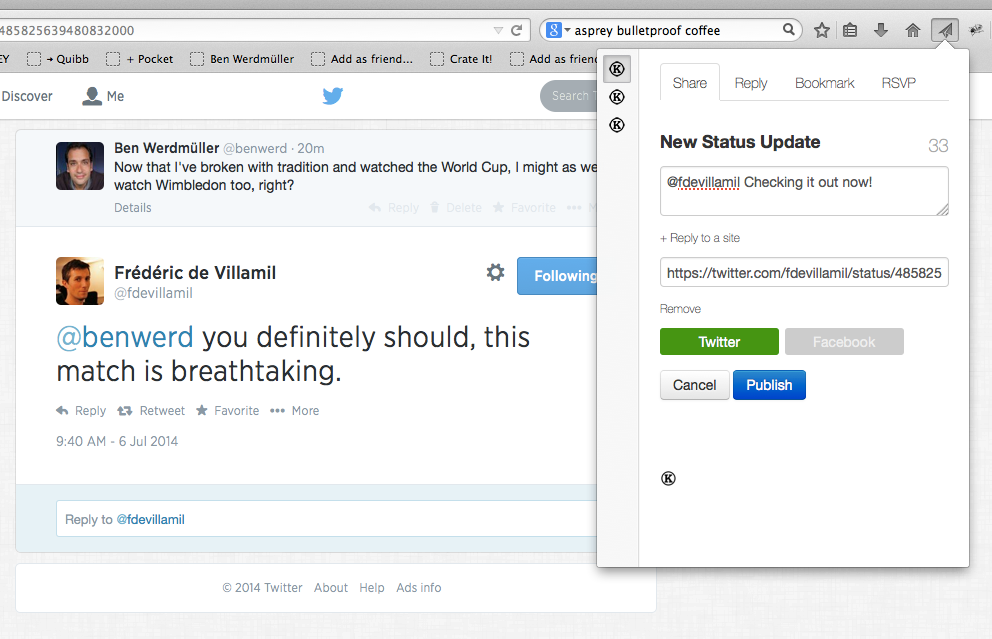
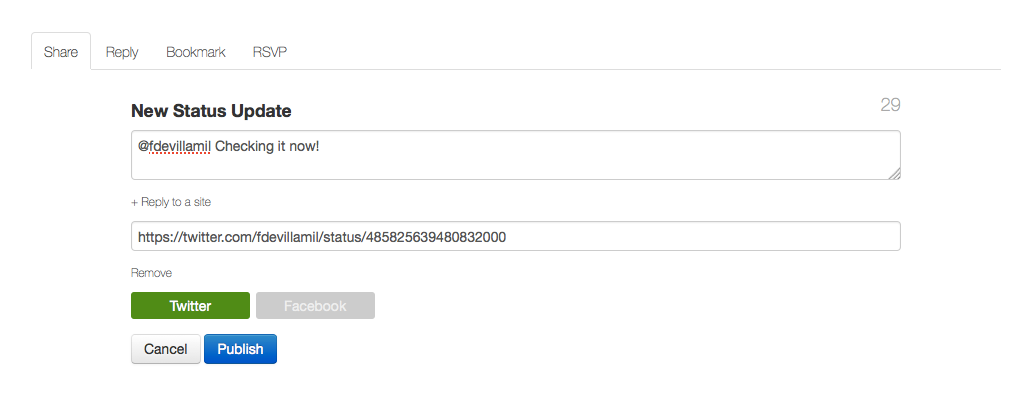




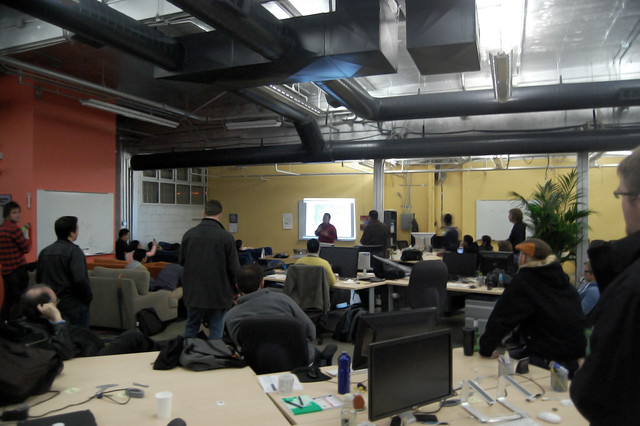
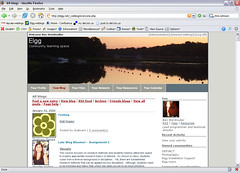





 While it's important to recognize the drawbacks, let's be real. The food is incredible, the city is beautiful, and although I have a lot of ambition to travel and live in different places around the world, I would also be happy if I stayed here for the rest of my life. Just the light is incredible: in Scotland the sun rises at 8:45am and sets at 3:50pm in January. Here it's steadily bright all year long. The people are friendly and helpful. It never freezes, but never gets too hot.
While it's important to recognize the drawbacks, let's be real. The food is incredible, the city is beautiful, and although I have a lot of ambition to travel and live in different places around the world, I would also be happy if I stayed here for the rest of my life. Just the light is incredible: in Scotland the sun rises at 8:45am and sets at 3:50pm in January. Here it's steadily bright all year long. The people are friendly and helpful. It never freezes, but never gets too hot.
 Friday marked the end of my first full-time week at
Friday marked the end of my first full-time week at 